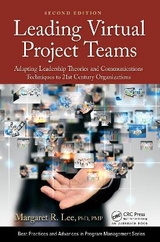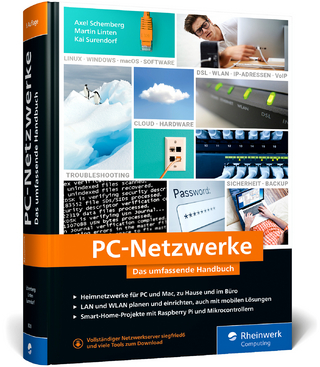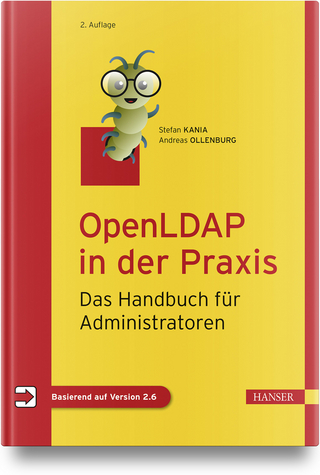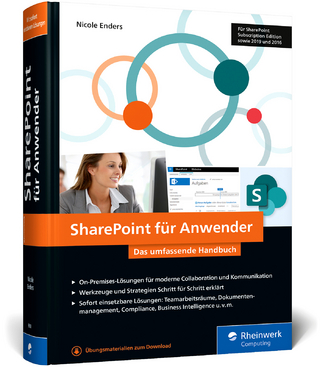
Leading Virtual Project Teams
Auerbach (Verlag)
978-1-4665-7688-9 (ISBN)
- Titel erscheint in neuer Auflage
- Artikel merken
Leading Virtual Project Teams: Adapting Leadership Theories and Communications Techniques to 21st Century Organizations addresses the challenges the virtual project management environment poses to traditional methods of leadership and communication. It introduces new approaches for adapting existing leadership theories to e-leadership as well as progressive tools and techniques to improve virtual project communications.
The book begins by examining the factors affecting the movement from traditional work environments to virtual organizations. It considers the challenges of leading multicultural, global organizations and reviews what e-leadership means. Illustrating the application of both traditional and new leadership models and theories to virtual project management, the book includes best practices for:
Managing and motivating the multicultural team
Communicating in a distributed work environment
Avoiding social isolation
Cyber-bullying in the virtual environment and e-ethics
Cultural management issues
Explaining how traditional leadership theories and models can be applied to contemporary projects, the book details methods virtual project managers can use to enhance virtual communications. The final chapter describes the e-leadership skills and competencies project managers will need to ensure sustainable success in today’s competitive business environment.
This book provides the virtual project manager with the tools and techniques to improve e-leadership and communications. Complete with case studies that illustrate real-world applications to the virtual challenges presented in each chapter, the book is a suitable text for educational institutions looking to increase understanding of project management leadership and communications outside the traditional project environment.
Margaret R. Lee, PhD, PMP®, has a doctorate in organization and management/project management from Capella University and is principal for LEE Consultants. Lee’s consulting practice assists educational facilities in strategically planning virtual project management and e-leadership development curricula and also provides basic project management training and consultation for small businesses to international corporations. LEE Consultants is a Registered Education Provider (REP) for the Project Management Institute (PMI). Lee’s professional experience includes corporate trainer, instructional designer, and project manager. She currently teaches at Blackburn College in Carlinville, Illinois, and Benedictine University in Springfield, Illinois. She also teaches online for Florida Institute of Technology and the University of Northwestern Ohio and is a frequent guest presenter at the University of Wisconsin–Madison Fluno Center for Executive Education and for Project Management Institute chapters throughout the United States. Lee is a referee for the International Journal of Project Management, is on the editorial review board for the International Journal of Mentoring and Coaching in Education, and was a reviewer for the 2012 PMI’s Research & Education Conference. An active member of the PMI Central Illinois chapter, she is a facilitator for their Springfield, Illinois, division’s PMP Exam Review Course Certification Training. Her recent presentations include "Using Discussion Forum Rubrics as a Teaching Strategy to Enhance Collaborative Learning in Online Courses" at the Association for the Advancement of Computing in Education (ACCE) World Conference on Educational Media and Technology; "Stakeholder Management" for the University of Wisconsin–Madison School of Business Fluno Center for Executive Education; and "Moving beyond the Ordinary Project Management Curriculum at the Graduate Level" as a panel symposium member at the PMI’s Research and Education Conference. Lee’s articles can be found in the Journal of Project, Program and Portfolio Management, Special Issue: Project Management Education in the Online World; Roadmap—Project Portfolio Management in Project Management Consulting Journeys, Destinations, and the Best Paths to Take; Training and Management Development Methods; International Journal of Project Management; and International Journal of Aging and Development: A Journal of Psychosocial Gerontology. She has published chapters in the following texts: Project Management; Public Leadership; and Encyclopedia of E-Business Development and Management in the Digital Economy, Volume II. The Project Management Professional® (PMP®) designation is a registered trademark of the Project Management Institute, Inc.
Overview
Virtual Terminology
Factors Affecting the Movement from Traditional Work Environments to Virtual Organizations
Challenges of Leading in Virtual Organizations
Looking Ahead: The Application of Traditional Leadership Models and Theories to Virtual Project Management
References
e-Leadership for Projects
Introduction
Defining e-Leadership
Application of Traditional Leadership Models and Theories to Virtual Project Management
Control-Related Leadership
Leadership through Empowerment
Transformational and Transactional Leadership Styles
Contingency School of Leadership
Situational Leadership Styles
Decision Tree Approach
Agile Project Management
Servant Leadership and Grateful Leadership
Models of Team Development
The ARCS Model
Entrepreneurial Leadership
Extreme Agility
Negative e-Leadership Approaches
Authoritarian Leadership Style
Laissez-Faire Leadership
Leader–Member Exchange Theory
Moving toward Multiple e-Leadership Styles
Benefits of Multiple Leadership Styles in Virtual Projects
Looking Ahead: Current Approaches to Virtual Communications
Food for Thought
References
Notes
Case Study References
Enhancing Virtual Project Communications
Understanding Project Communications
e-Leadership for Virtual Project Communications
Planning for Project Communications
Communications Plan
Various Approaches to Virtual Communication
Different Methods
Tools and Techniques to Enhance Communications for Virtual Organizations
Communications Technology
Virtual Etiquette
Sharing Knowledge
Communicating in a Nonverbal World
Best Practice Approaches
Face-to-Face Communications
Teleconferences and Telephone Calls
Collaboration Tools
Using Multiple Leadership Styles to Communicate to Distributed Teams
Situational Communication Styles
Servant Leadership Communication
Communication with Empowerment
Entrepreneurial Leadership Communication Skills
Looking Ahead: Cultural Communication Issues and Effective e-Leadership
Food for Thought
References
Notes
Case Study Reference
Cultural Communication Issues and Effective e-Leadership
Understanding Culture
Primary Dimensions of Culture
Individualistic versus Collectivistic Cultures
Low-Context versus High-Context Cultures
Low-Power Distance versus High-Power Distance Cultures
Masculine versus Feminine Cultures
Monochronic versus Polychronic Cultures
Low Uncertainty Avoidance versus High Uncertainty Avoidance Cultures
Cultures within the Organization
Organizational Culture
Team Culture
Boundary Crossing
Project Management Cultures
Culture of the Virtual Nomad
Integrating Organizational and National Cultures
Integrating Cultures
Leading the Integrated Culture
Globalization and Communications
Barriers to Globalization
Communicating across Cultures
Cultural Fluency
Use of Language and Words
Communicating across Time Zones
Deadlines and Urgency Issues
Age Discrimination as Cultural Awareness
Religious Considerations in the Multicultural Team
Second Language Concerns
Flexibility in Communicating with Multicultural Teams
Looking Ahead: e-Leadership Competencies
References
Case Study Reference
Notes
Virtual Project Leadership Competencies
Competencies in Project Management
Virtual Project Management Competencies
Competencies for Leading Virtual Projects
Focusing on the Vision of the Project
Clarity of Virtual Structure and Processes
Team Charter
Code of Conduct
Monitoring and Controlling the Virtual Project
Project Meetings
Status Reporting and Accountability
Managing the Virtual Team
Building Team Cohesiveness Virtually
Motivating the Virtual Team
Types of Motivators
Retention
Empowering the Team
Relationship Building and Trust
Managing Social Isolation
Politics and Cyberbullying in the Virtual Environment
Indicators of Inappropriate Virtual Team Member "Fit"
e-Ethics
References
Notes
Index
| Reihe/Serie | Best Practices in Portfolio, Program, and Project Management |
|---|---|
| Zusatzinfo | 37 Tables, black and white; 16 Illustrations, black and white |
| Verlagsort | London |
| Sprache | englisch |
| Maße | 156 x 234 mm |
| Gewicht | 522 g |
| Themenwelt | Mathematik / Informatik ► Informatik ► Netzwerke |
| Wirtschaft ► Betriebswirtschaft / Management ► Projektmanagement | |
| ISBN-10 | 1-4665-7688-X / 146657688X |
| ISBN-13 | 978-1-4665-7688-9 / 9781466576889 |
| Zustand | Neuware |
| Informationen gemäß Produktsicherheitsverordnung (GPSR) | |
| Haben Sie eine Frage zum Produkt? |
aus dem Bereich



